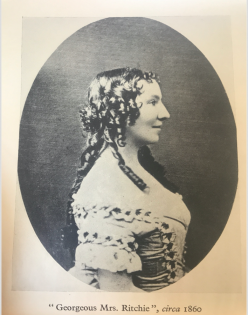PRUDENCE: (returning L.) There’s Betsy trying to make out that reading without her spectacles. (takes a pair of spectacles out of her pocket and hands them to Mrs. Tiffany) There, Betsy, I know, you were going to ask for them. Ah! They’re a blessing when one is growing old!
MRS. TIFFANY: What do you mean, Prudence? A woman of fashion never grows old! Age is always out of fashion.”
Mowatt asks: are American values out of Fashion?
While the prologue might simply advertise wit, underneath the farce Mowatt’s piece had a political bent to it. Mowatt comments on a trend she identifies among the wealthy, arguing that fashion has become “potentially a tool for reshaping society along aristocratic lines,” which is antithetical to American values of independence and economy[1].
Mrs. Tiffany is the most obvious offender of values, foolishly obsequious to anyone with foreign ties that she finds sophisticated, and desperate to impress through ostentatious clothing and affectations. Fashion is not just clothing, it is also behavior. Her husband is no innocent; he indulges her spending and commits forgery to maintain their lifestyle.
Adam Trueman arises as the stalwart American hero, horrified at what fashion has wrought and capable of restoring order. Trueman’s “references to Tiffany’s happier days as a simple peddler in rural New York,” and Tiffany’s move to trade his daughter to save his own reputation allow Mowatt to question “the object of Americans’ obsession with financial success.[2]” Trueman’s age, rhetoric, rural background, and diction all associate him with the times of the revolution, and his name underscores it all. Because of these cues, “his social judgment gains added weight from the audience’s sense that it is grounded in the principles of the nation’s founding political struggles.[3]”
The complexity of the social commentary in a piece that otherwise conforms to the melodramatic writing style elevated Mowatt’s writing, and added the work into the American dramatic cannon. Fashion has been called her “major contribution to the drama” and “a landmark in the process of American social comedy.[4]”
[1] (Richardson 100).
[2] (Richardson 102).
[3] (Richardson 101).
[4] (Meserve 87).
